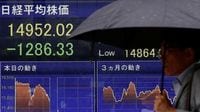SINGAPORE (Reuters) - The Bank of Japan's monetary policy reboot on Wednesday was met with a rising dollar, tepid Asian stock markets and a broad uptick in bond yields, indicating investors struggled for clarity on what the changes mean for global risk appetite.
At the outset, the BOJ's overhaul of its quantitative easing program appeared bold - shifting from targeting the volume of asset purchases to levels on the yield curve, keeping its negative short-term policy rate and aiming to overshoot an already ambitious 2 percent inflation target.
Japanese stock markets pushed higher, heartened by the central bank's plans to help the banking system through higher long-term yields alongside amendments the BOJ made to its program for buying exchange-traded funds (ETFs).
Yet, there was plenty of detail in the new framework that left investors wondering if the BOJ was actually trying to ease back its massive stimulus.
"The measures don't add a lot of stimulus into the system," said Sim Moh Siong, currency strategist at Bank of Singapore. "The message is to address some of the side-effects of past monetary easing, and one of those has been that negative rates, and a flattening of the yield curve, has hurt the financial sector."
Japanese government bonds fell, pushing 10-year yields to the bank's new target of zero percent, while U.S. Treasury and European bond yields rose, as did those in some Asian markets, as investors reconciled to a new world in which other central banks might also put a floor under long-term rates.
Peter Schaffrik, Royal Bank of Canada's chief European macro strategist, noted the similarity of the challenges faced by the BOJ and the European Central Bank - the limited availability of bonds they can buy back from markets, and the costs to banks of very flat yield curves.
"For now, it appears likely that markets will start thinking about whether the BOJ's new path offers a new line of thinking for the ECB, too," he said in a client note.
NEW WORLD
Equity markets in Australia and other parts of Asia rose only hesitantly, worried about whether the BOJ was tacitly conceding it would no longer continue pumping in the cash that has propped up markets since the 2008 global financial crisis.
"The impression is the BOJ is starting to pull back some of its troops from the battlefront," said Katsutoshi Inadome, a senior fixed income strategist at Mitsubishi UFJ Morgan Stanley Securities in Tokyo.
"Markets could now begin testing the BOJ's commitment to its price target in the next few months, just as the Bank of England and its commitment to the pound was challenged in the past."
The BOJ said it was abandoning its monetary base target, but would continue buying long-term government bonds at a pace that ensures its holdings increase by 80 trillion yen ($781 billion) a year.
"Risk markets have been accustomed to more policy easing over the summer and the realization is gradually sinking in that may not be the case going into the year-end," said Karine Hirn, a partner at East Capital in Hong Kong. "We expect more choppiness and uncertainty in markets in the coming days."
The yen weakened both against the U.S. dollar and the euro, with the dollar rising at one point to a one-week high of 102.79 yen.
Ahead of the U.S. Federal Reserve's policy review later on Wednesday, market participants also wrestled with the uncertainty over how far the yen's weakness would be sustained, and what that might mean for the BOJ's latest commitments.
"The lack of commitment to regular systematic asset purchase, lack of more negative interest rate policy and fresh policy initiative, plus the nagging doubt that the 2 percent inflation target can be achieved, let alone an overshoot, leaves us expecting further yen strength as disappointment sets in," wrote Robert Rennie, chief strategist at Westpac in Sydney.
"We have been expecting dollar/yen to test and break 100. Notwithstanding the risks surrounding the FOMC tonight, we remain of that view," he added.
(Reporting by Vidya Ranganathan, with additional reporting by John Geddie in London; Editing by Ian Geoghegan)



